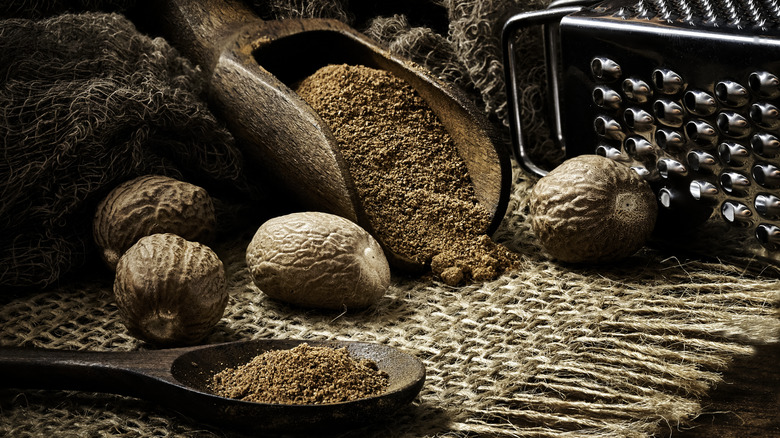Why You Should Start Seasoning Your Soups With Nutmeg
Making soup like a professional chef involves using a variety of herbs and spices. There's cardamom, oregano, basil, ginger, garlic powder, and others. For example, dill and parsley can bring out the flavor of chicken soup. But if you're cooking tomato soup, herbs and spices such as basil, oregano, cayenne pepper, rosemary, and chili powder are better suited. A less common choice is nutmeg, a warming spice used in both sweet and savory dishes.
As surprising as it may sound, nutmeg can be a wonderful addition to butternut squash soup, broccoli soup, tomato soup, and some cream soups. Its nutty, slightly sweet flavor complements most vegetables without overpowering them. It goes particularly well with carrots, sweet potatoes, pumpkin, and spinach, but it also pairs nicely with chicken and dark meats.
This warming spice is also rich in antioxidants and anti-inflammatory compounds with health-promoting properties. Macelignan, one of its key nutrients, may protect against cancer, diabetes, liver disease, and photoaging, according to 2016 evidence published in Phytochemistry Reviews. Other compounds in nutmeg support metabolic and cardiovascular health and may benefit people with obesity, diabetes, or heart disease, note the researchers.
Nutmeg can turn your soup into a gourmet experience
Nutmeg is the seed of Myristica fragrans, a tree that grows in Indonesia, Malaysia, and other Asian countries. It's used both as food and medicine and may be hallucinogenic when consumed in large quantities. However, you'd have to ingest at least five grams (around two teaspoons) to experience these effects. Most recipes only call for a half teaspoon or less.
Leaving this aspect aside, nutmeg can add a warm, nutty flavor to soups, stews, mac and cheese, puddings, and beverages like eggnog and cocktails. It's a fantastic choice for fall and winter soups, especially those made with squash, potatoes, celery, and pasta or grains. A pinch of freshly grated nutmeg can add depth to pumpkin cream soups, vegetable broths, or heartier soups with meats like beef or lamb. You can also use it in minestrone for a rich, nutty aroma.
"I am in love with the shape, scent, and feel of it," executive chef Aishling Stevens tells Insider. "It brings a subtle earthiness and balance." Ideally, use freshly grated nutmeg, as it has a more fragrant aroma than ground. Grate it directly into the soup immediately before serving to preserve its distinct flavor.
This earthy spice may help soothe an upset stomach
Need another reason to use nutmeg? According to Phytochemistry Reviews, this earthy spice may help with indigestion, bloating, colic, and other digestive problems. "When I was a child, my mother often grated it into soups or beverages when I felt poorly," executive chef Aishling Stevens explains. The essential oils in nutmeg boost the production of digestive enzymes, which may improve digestive health.
That said, add this spice to your favorite soups to amp up their flavor and give them a gourmet touch. You can also mix it with other spices, such as cinnamon, ginger, or cumin seeds, and sprinkle them over soups, lamb kebabs, koftas, or porridge. If you ever run out of nutmeg, substitute with mace, garam masala, or cloves, which have similar flavors. For example, mace is produced from the shell of nutmeg and can replace the latter in most recipes. Its aroma is spicier and more intense, with notes of cinnamon and black pepper.


